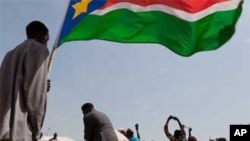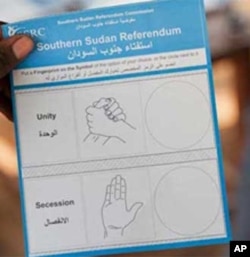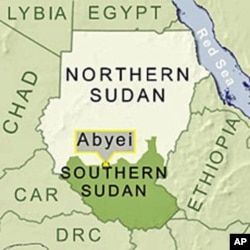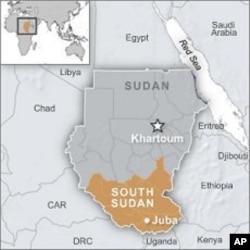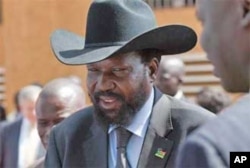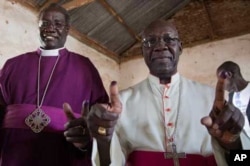A Sudanese political observer compares the formal break-up of the country to a delicate medical operation.
"The situation between north and south is like [separating] Siamese twins. Any surgical mistakes could destroy both of them, " says El Moiz Abunura, a political consultant on Sudan and former senior economist in the Ministry of Energy.
He says one of the toughest decisions is how to split oil revenues, which account for much of the budgets of the Government of Sudan in Khartoum and the Government of Southern Sudan in Juba. Today proceeds are divided equally from the sale of oil, which is produced in the south, but taken through a system of pipelines to the north for processing and export. Abunura says the south should continue with the agreement and not create tension with talk of building an alternate pipeline from the south through neighboring Uganda or Kenya.
Debt
Khartoum and Juba will also have to decide how to divide over 36 billion dollars in debt owed to international creditors.
Jon Temin, director of the Sudan Program at the Washington-based US Institute of Peace, says there are various ways to solve the problem.
"One," he says, "might be to try to identify what the debt was incurred for, what kind of projects, if they benefitted the north and south, and to attribute the debt accordingly."
Or the two regions could divide the amount they owe based on their populations or on their share of the gross domestic product. They could also work with creditors to gain debt relief.
Boundaries
North and South Sudan will also have to negotiate issues of citizenship and residency for the millions of southerners who work in the north and the northerners, many who are businessmen, living in the south.
Borders will also have to be defined. Sudan’s north-south boundary is one of the longest between neighboring African countries.
One of the most contentious border disputes involves the oil-rich enclave of Abyei, which lies between the two regions. Both Khartoum and Juba claim Abyei, which is also the site of occasional violence between the region’s Dinka cattle herders and Arab-speaking Misseriya pastoralists from the north who bring their livestock to the region to graze during the dry season.
A Sudan analyst with the International Crisis Group, Zach Vertin, says such migratory tensions are usually handled by local and state officials.
"Given the politicized atmosphere around the referendum and the final stretch of the CPA," says Vertin, "tensions are particularly high in Abyei and some other border areas."
"Because a solution to the Abyei problem has yet to be brokered, the annual migration is currently on hold, and incidents of violence have broken out. The kind of local-level discussions that are historically the answer are not taking place. If solutions to cross-border migratory issues—including routes, movement, security, and taxation—can not be negotiated, then you risk a continuation of localized conflict, which can spiral out of control."
Vertin says the solution is for the north and south to keep their mutual border as porous, or “soft”, as possible to allow the free movement of traders and herders essential to the economy. A similar policy already in place between Sudan and Egypt allows their citizens to enjoy what are called the “four freedoms” -- movement, residence, ownership and work in either country.
Another idea would be dual citizenship for citizens of the two regions. So far, President Omar al-Bashir has spoken against the proposal, though he says he does favor establishing a set of economic and developmental agreements with Juba.
International Treaties
Analyst Jon Temin says a new southern Sudan would have to join several international treaties, like the one governing share of the Nile River waters. Egypt is the largest single consumer of the waters but is concerned that southern Sudan could join up-stream countries in East Africa in pushing for a greater share.
"We have simultaneously the possibility of a [new] southern Sudanese state and efforts to renegotiate access to the Nile by some of the upstream countries, Ethiopia in particular," says Temin.
"The Sudanese are providing assurances they will continue to work under existing quotas and divide the quota for access to the Nile between the north and the south if there is secession."
With the creation of a new nation in July, the internal politics of the north and south are also likely to change.
President Bashir favors turning the north into an Islamic republic, a move that would reverse efforts under the five-year-old Comprehensive Peace Agreement to establish rights for religious and ethnic minorities.
Some say the partition of the country creates for the Khartoum-based Republic of Sudan a new set of southern states within its re-drawn borders. The states have sizeable non-Arabic minorities with cultural and political ties to the Government of Southern Sudan in Juba.
Analyst Zach Vertin says that leaves Khartoum with the same problems that led to the break-up of the country.
"When south Sudan votes for secession," says Vertin, "they will opt out of the fundamental Sudan problem. But that problem will remain – the concentration of wealth and power at the center, in Khartoum, at the expense of the country’s peripheries. We’ve seen similar grievances in South Kordofan, Blue Nile, the transitional areas, in the east, and in Darfur. That center-periphery dynamic remains, and those constituencies will continue to try to push an agenda of democratic transformation."
For the south, analysts say the government will need to be inclusive and contain groups that until now have been held together by their common enemy, the Arab north.
It will also have to settle disputes over land between returnees whose property is occupied or has been redistributed by the government or military.
Land
Sara Pantuliano is a research fellow and head of the Humanitarian Policy Group with the Overseas Development Institute in London. She says in Juba, tensions between the local Bari group and others make it a test for the unity of southern Sudan.
"Juba needs to prove it can be a capital for all southern Sudanese," says Pantuliano.
"It must be able to accommodate southerners of different nationalities. The indigenous people of Juba, the Bari, see Juba as [their] land and find it difficult to accept large numbers of the Dinka, Nuer and others…they feel it is an occupation of their own ancestral land. That is not an easy tension to dissipate, especially considering that the Dinka do have a position of power in the government."
Analyst Jon Temin says southern unity depends on how the new government handles expectations in a region facing the return of tens of thousands of people from the north.
Social and economic problems add to the challenge. The south includes fewer than 40 miles of paved road and a 20 percent literacy rate. Less than half of the population has access to clean water.
High Expectations
"There are high expectations among the southern population about improvements in life that will happen after the referendum and independence," says Temin. "[They] will be almost impossible for the Government of Southern Sudan to meet…. They have shown very limited capacity to deliver services like health care, schools and so forth.
"There are some good reasons for that, but they will nevertheless have to increase that capacity significantly to meet some of those expectations. How long do people wait for such things?"
The U.S. government is working to encourage a peaceful transition to independence and joint cooperation between the north and south. In response to a peaceful solution to fighting in Sudan’s western Darfur province and a smooth transition for the south, the administration is offering Khartoum what President Barack Obama calls “a path to normal relations” with the United States. That would include a lifting of economic sanctions and removing Sudan from the list of states that sponsor terrorism.
If the south chooses independence, says President Barack Obama, the international community and the United States will have an interest in ensuring that the two nations that emerge succeed as stable and economically viable neighbors.




